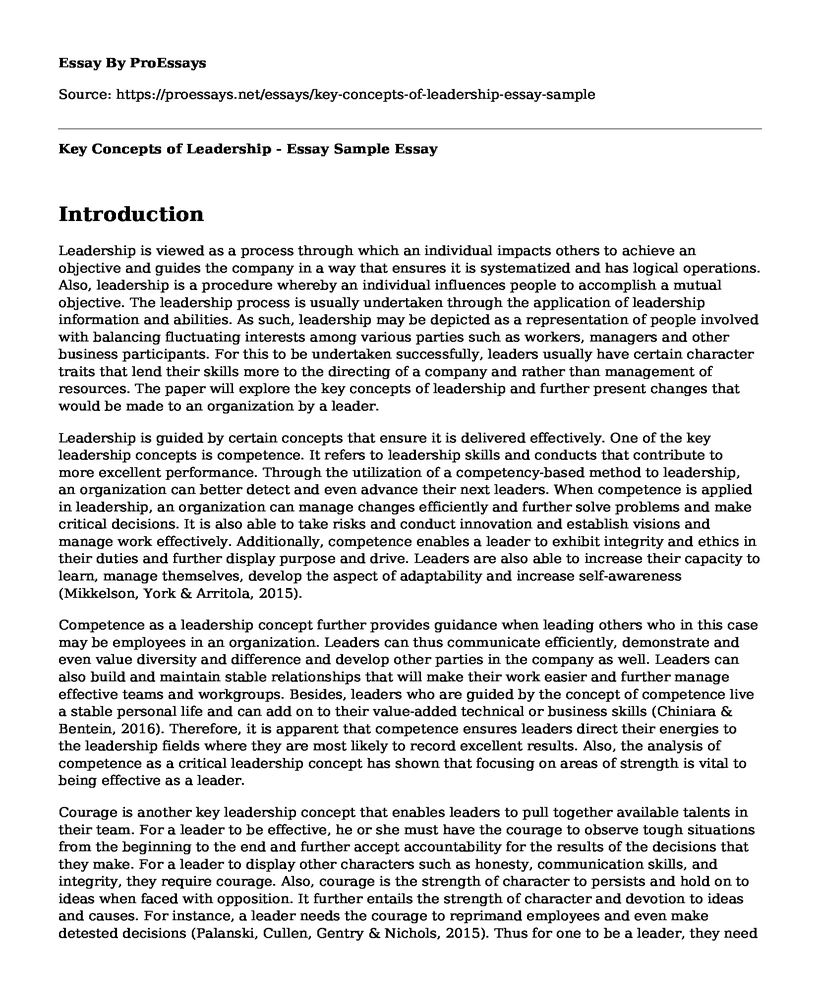Introduction
Leadership is viewed as a process through which an individual impacts others to achieve an objective and guides the company in a way that ensures it is systematized and has logical operations. Also, leadership is a procedure whereby an individual influences people to accomplish a mutual objective. The leadership process is usually undertaken through the application of leadership information and abilities. As such, leadership may be depicted as a representation of people involved with balancing fluctuating interests among various parties such as workers, managers and other business participants. For this to be undertaken successfully, leaders usually have certain character traits that lend their skills more to the directing of a company and rather than management of resources. The paper will explore the key concepts of leadership and further present changes that would be made to an organization by a leader.
Leadership is guided by certain concepts that ensure it is delivered effectively. One of the key leadership concepts is competence. It refers to leadership skills and conducts that contribute to more excellent performance. Through the utilization of a competency-based method to leadership, an organization can better detect and even advance their next leaders. When competence is applied in leadership, an organization can manage changes efficiently and further solve problems and make critical decisions. It is also able to take risks and conduct innovation and establish visions and manage work effectively. Additionally, competence enables a leader to exhibit integrity and ethics in their duties and further display purpose and drive. Leaders are also able to increase their capacity to learn, manage themselves, develop the aspect of adaptability and increase self-awareness (Mikkelson, York & Arritola, 2015).
Competence as a leadership concept further provides guidance when leading others who in this case may be employees in an organization. Leaders can thus communicate efficiently, demonstrate and even value diversity and difference and develop other parties in the company as well. Leaders can also build and maintain stable relationships that will make their work easier and further manage effective teams and workgroups. Besides, leaders who are guided by the concept of competence live a stable personal life and can add on to their value-added technical or business skills (Chiniara & Bentein, 2016). Therefore, it is apparent that competence ensures leaders direct their energies to the leadership fields where they are most likely to record excellent results. Also, the analysis of competence as a critical leadership concept has shown that focusing on areas of strength is vital to being effective as a leader.
Courage is another key leadership concept that enables leaders to pull together available talents in their team. For a leader to be effective, he or she must have the courage to observe tough situations from the beginning to the end and further accept accountability for the results of the decisions that they make. For a leader to display other characters such as honesty, communication skills, and integrity, they require courage. Also, courage is the strength of character to persists and hold on to ideas when faced with opposition. It further entails the strength of character and devotion to ideas and causes. For instance, a leader needs the courage to reprimand employees and even make detested decisions (Palanski, Cullen, Gentry & Nichols, 2015). Thus for one to be a leader, they need courage that will further ensure aspects such as robust and efficient decisions that affect the organization have been made.
The third leadership concept is clarity. For a leader to be great, they need to lead with clarity when faced with doubt. During doubt times, it is relevant to note that they can distort the effective operation of activities. As a leader, it is essential to raise important questions since people are dependent on them for direction. Lack of vision during such a time can stall operations of the firm and even reduce their competitive level in the market or industry. On the other hand, there is coaching, another leadership concept. Leaders might purport that they are good than any other individual on the basis of skills and knowledge possession. However, it is vital for leaders to enhance their skills and abilities to lead and further assist an organization to attain its operational objectives (Chiniara & Bentein, 2016). Thus coaching offers a leader a better comprehension of aspects such as developing a vision and setting realistic goals among others.
Conclusion
Leaders have been observed to lead without character, which is a crucial leadership concept. However, it is fundamental to note that lack of character in a leader means that they are not worth emulating. Having character indicates that a person has the moral authority that they require to bring people together and even resources to operate an organization. Moreover, character in a leader enables them to care about their subordinates genuinely. In this way, there will be strong inner ties within the firm and more success in general (Cornelius, 2016).
Cite this page
Key Concepts of Leadership - Essay Sample. (2022, Nov 17). Retrieved from https://proessays.net/essays/key-concepts-of-leadership-essay-sample
If you are the original author of this essay and no longer wish to have it published on the ProEssays website, please click below to request its removal:
- Essay Sample on Self-Managed Teams
- Essay Sample on Contingency and Situation Theories of Leadership
- Essay Sample on Asia's Corrupt Practices: 16 Countries Fight for Sustainable Development
- Emergency Physicians: Ethical Dilemmas & Decision-Making - Essay Sample
- Navigating Clinical Trials: GCP, Ethical Considerations and Project Management - Essay Sample
- Conflict Management in Nursing: Strategies for Leaders - Essay Sample
- Free Essay Sample on Captain Sullenberger: Leading 155 to Safety After Bird Strike







